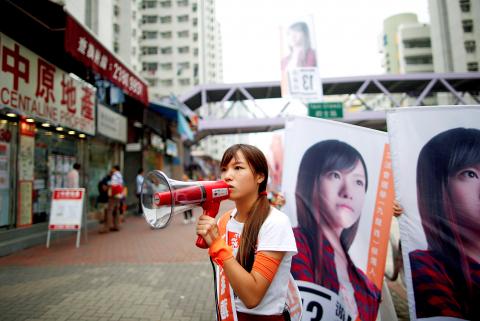Hong Kongers yesterday voted in their most crucial election since the handover from Britain in 1997, the outcome of which could pave the way for a fresh round of political confrontations over Beijing’s control of the territory.
The vote for Legislative Council lawmakers is to test the unity of Hong Kong’s pro-democracy camp, as a new generation of activists, who emerged in the wake of the 2014 pro-democracy Umbrella movement, joined the race.
They are hoping to ride a rising tide of anti-China sentiment as they challenge formidably resourced pro-Beijing rivals for seats.

Photo: Reuters
Many of the newcomers back the previously unthinkable idea of independence for Hong Kong, which has added to divisions with the broader pro-democracy movement and overshadowed the election.
Hong Kongers feel they have few other negotiating tactics left in their battle for genuine democracy as Beijing takes an increasingly hard-line stance.
“It’s bleak, but I think if China doesn’t leave us to do what we want, I think the only way is to fight for independence,” said Aron Yuen, a 34-year-old college lecturer, as he stood in a line of about 100 other people to cast their ballots.
“You can’t negotiate with somebody who doesn’t keep their promise,” Yuen said.
He planned to vote for the 23-year-old Nathan Law (羅冠聰) who, along with teen activist Joshua Wong (黃之鋒), played a key role leading the 2014 protests. Their party, Demosisto, advocates a referendum on “self-determination” of Hong Kong’s future.
At stake is the power to keep the territory’s widely unpopular Beijing-backed chief executive, Leung Chun-ying (梁振英), and his government in check. “Pan-democrat” lawmakers control 27 of 70 seats, compared with 43 held by lawmakers friendly to Beijing.
The democrats are fighting to keep control of at least a third of the seats, which gives them veto power to block government attempts to enact unpopular legislation, such as Beijing’s controversial election revamp that triggered the 2014 street protests.

SECURITY: As China is ‘reshaping’ Hong Kong’s population, Taiwan must raise the eligibility threshold for applications from Hong Kongers, Chiu Chui-cheng said When Hong Kong and Macau citizens apply for residency in Taiwan, it would be under a new category that includes a “national security observation period,” Mainland Affairs Council (MAC) Minister Chiu Chui-cheng (邱垂正) said yesterday. President William Lai (賴清德) on March 13 announced 17 strategies to counter China’s aggression toward Taiwan, including incorporating national security considerations into the review process for residency applications from Hong Kong and Macau citizens. The situation in Hong Kong is constantly changing, Chiu said to media yesterday on the sidelines of the Taipei Technology Run hosted by the Taipei Neihu Technology Park Development Association. With

CARROT AND STICK: While unrelenting in its military threats, China attracted nearly 40,000 Taiwanese to over 400 business events last year Nearly 40,000 Taiwanese last year joined industry events in China, such as conferences and trade fairs, supported by the Chinese government, a study showed yesterday, as Beijing ramps up a charm offensive toward Taipei alongside military pressure. China has long taken a carrot-and-stick approach to Taiwan, threatening it with the prospect of military action while reaching out to those it believes are amenable to Beijing’s point of view. Taiwanese security officials are wary of what they see as Beijing’s influence campaigns to sway public opinion after Taipei and Beijing gradually resumed travel links halted by the COVID-19 pandemic, but the scale of

A US Marine Corps regiment equipped with Naval Strike Missiles (NSM) is set to participate in the upcoming Balikatan 25 exercise in the Luzon Strait, marking the system’s first-ever deployment in the Philippines. US and Philippine officials have separately confirmed that the Navy Marine Expeditionary Ship Interdiction System (NMESIS) — the mobile launch platform for the Naval Strike Missile — would take part in the joint exercise. The missiles are being deployed to “a strategic first island chain chokepoint” in the waters between Taiwan proper and the Philippines, US-based Naval News reported. “The Luzon Strait and Bashi Channel represent a critical access

Pope Francis is be laid to rest on Saturday after lying in state for three days in St Peter’s Basilica, where the faithful are expected to flock to pay their respects to history’s first Latin American pontiff. The cardinals met yesterday in the Vatican’s synod hall to chart the next steps before a conclave begins to choose Francis’ successor, as condolences poured in from around the world. According to current norms, the conclave must begin between May 5 and 10. The cardinals set the funeral for Saturday at 10am in St Peter’s Square, to be celebrated by the dean of the College